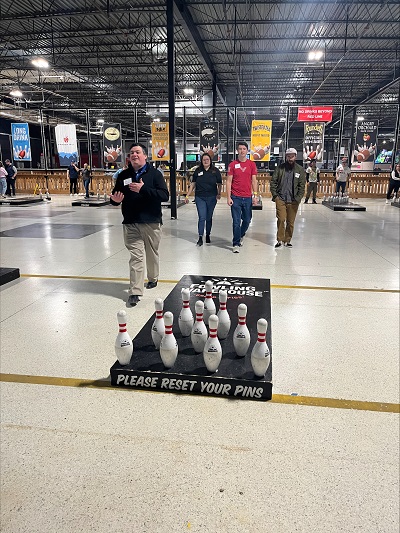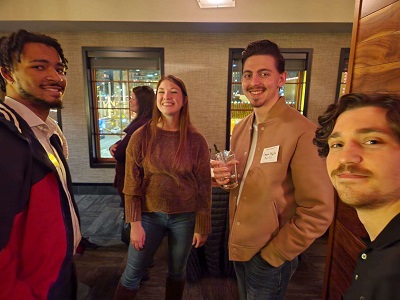On the third and final day of legislation at the 2022 GCC, the proceedings took an unplanned turn. The Grand Chapter had worked through and debated 13 proposed amendments to Bylaws and Ritual, handled the necessary procedural items and heard reports
from Fraternity and Leadership Foundation leaders. Some proposals had broad approval, others struggled to find support, but all debated with varying views shared. It was during debate of an ultimately failed attempt to reconsider a proposal that
had failed the day before that the delegates voices came together in a singular message. While the desired approach was unclear, the intent of the proposal seemed to strike a chord with delegates, who agreed change was needed. That was when the
Grand Chapter chose to enter a committee of the whole – a procedural tool to relax the stringent rules of normal proceedings and allow for a more open dialogue. The topic: the delegates’ desires related to representation, structure
and governance.
While the discussion had not been planned, the message was clear. Grand President Cory Stopka explains, “The delegates spoke of a desire for a more strategic Board of Directors. They spoke of a vision for the Fraternity where there was greater
diversity of leadership and improved paths to leadership. Most importantly, the delegates made clear that while they were not supportive of the specific proposals for change to the Board structure that had been presented to them, they desired
change.”
As the 54th Grand Chapter Congress came to a close, the Board of Directors knew they had work to do—even if they were not yet sure or in agreement on what that work would be.
Following numerous discussions, both as a full Board and in separate conversations with Board members and other stakeholders, the Fraternity engaged with governance educator and consultant Matt Fullbrook to facilitate a board training session aimed
at helping to scope the necessary work and help the Board align on desired outcomes. That session took place immediately preceding the January Board of Director’s meeting, which was then used as an opportunity to put training into practice.
Defining Good Governance
Through the months of discussions and the training exercises, it became clear the Board agreed with each other and the delegates on the desire to become more strategically focused. Determining how to achieve that goal was more challenging. What
does it mean to review an organization’s governance? What is good governance? How do we know if Deltasig has it?
Through the training exercise, and with Fullbrook’s assistance, the Board adopted a definition of good governance: “Intentionally creating effective conditions for making decisions.” Grand President Stopka explains, “As
a Board, we had fallen into the trap of equating governance with structure. Certainly the Board structure and overall leadership structure are an important aspect, but by scoping such a narrow view of the reviews, we would miss out on other possibilities.
By introducing the dialogue of conditions for making decisions, we acknowledge there are factors beyond structure, and even opportunity to make an impact quicker than Bylaw changes would allow.”
Taking Action
With a definition and vision in hand, the Board wasted no time in taking steps to improve the conditions that allow the Board to achieve strategically focused meetings. Through delegation within existing policies and adoption of policy amendments,
the Board was intentional about removing operational debates from future Board agendas. The Board empowered the Central Office staff and local volunteer leadership to handle chapter issues that previously required Board members’ involvement.
National committees were empowered to take action as they see fit on processes such as awards and leadership training, and the Central Office staff was delegated responsibility for establishing metrics to measure the health of our chapters. These
actions are a first step toward allowing future Board agendas that are more strategic, but the job isn’t done.
Making Plans for Future Action

At the January meeting, the Board also agreed to future steps while looking toward the end of the biennium and another Grand Chapter Congress in summer 2023. First, the Provincial Vice Presidents agreed to organize feedback opportunities at their
respective Provincial Council meetings around the question, “What are we trying to achieve as a Fraternity?” A late-spring Board meeting was also planned with the purpose of reviewing Deltasig’s strategic purpose or vision, and
reviewing the “conditions” currently surrounding our decision-making process. Grand President Stopka explains that “As we head toward Grand Chapter Congress in Houston, we won’t be armed with legislative proposals as much
as intentional questions to ask the delegates. Our goal is that the Board of Directors can enter the next biennium with additional delegate feedback in one hand, clearly identified conditions for review in the other, and an optimistic vision for
where to head as a path in front of them.”
Strategic Priorities Update: Membership Growth
At the January Board of Directors meeting, the Board gave direction to continue development of a project for strategic expansion in the Pacific Northwest. Read the back cover for additional information and opportunities to help. We also welcome assistance
with these existing startup groups’ growth and development:
- East Carolina University
- Clark Atlanta University
- University of Vermont
- The College of William & Mary
- Villanova University
- University of Wisconsin-Whitewater
- Stevens Institute of Technology
Strategic Priorities Update: Member Education
In order to take the next step in educating our members, we must create conditions that foster growth and new ideas. The Central Office is excited to welcome two new members to the team: Luke Schamer and Lisa Christie.
Luke Schamer became Delta Sigma Pi’s new Director of Education in November. Luke graduated from University of Dayton with a bachelor’s degree in education, and then earned his master’s degree in education with a major in learning
and technology. He has worked for Montgomery County (Ohio) Juvenile Courts, IDEA Public Schools in Texas, and Walnut Hills High School in Cincinnati. His myriad responsibilities have included professional development, curriculum design and
serving as a teacher mentor.
Lisa Christie has been hired as Associate Director of Events, and began working in the role in February. Lisa has nearly 25 years of experience in event and hospitality management, which includes meeting and conference planning. Ten of those years
were spent planning and managing meetings for NADD Association.
Senior Director of Member Engagement Heather Troyer explains “We have a long history of strong events that mix both the educational and social sides of Deltasig. As we transition to this new and expanded education and events staff it is important
that we maintain the outstanding quality we already have. However, the expanded staff is designed to simultaneously push us further. We want our events to reach a wider audience than ever before. We want our educational offerings both at in-person
events and beyond to be a highly beneficial piece of membership. More than anything though, we want the programs of tomorrow to be the leading edge for how we engage, train and interact with Deltasigs from all phases of life.”
Luke said, "I look forward to focusing on the following objectives during my first year in the role: 1. Creating and refining engaging and worthwhile content for our members; 2. Developing overarching objectives for learning in our organization
that will serve as anchors in all educational programming we provide; and 3. Gathering feedback and input from a variety of members and stakeholders to help shape our educational offerings. My goal is to use this information to best serve Deltasigs
and reflect our organization’s most critical needs."

Strategic Priorities Update: Member Engagement
Alumni receptions are back! Started in 2020 and then paused because of COVID, alumni receptions are a joint initiative between the Fraternity and Leadership Foundation to re-engage alumni in a city. Each free event is unique, but they always have
the same goals: having fun and meeting other Deltasigs. Interested in helping host a reception near you? Contact alumni@dsp.org for information on how to help.
Strategic Priorities Update: Organizational Excellence
The Board of Directors has asked staff to lead the development of a new mechanism for monitoring the health of a chapter. This includes a review of the existing Chapter Management Program, but also establishes a new standard. Interested in helping
or have thoughts to share? Contact cmp@dsp.org.